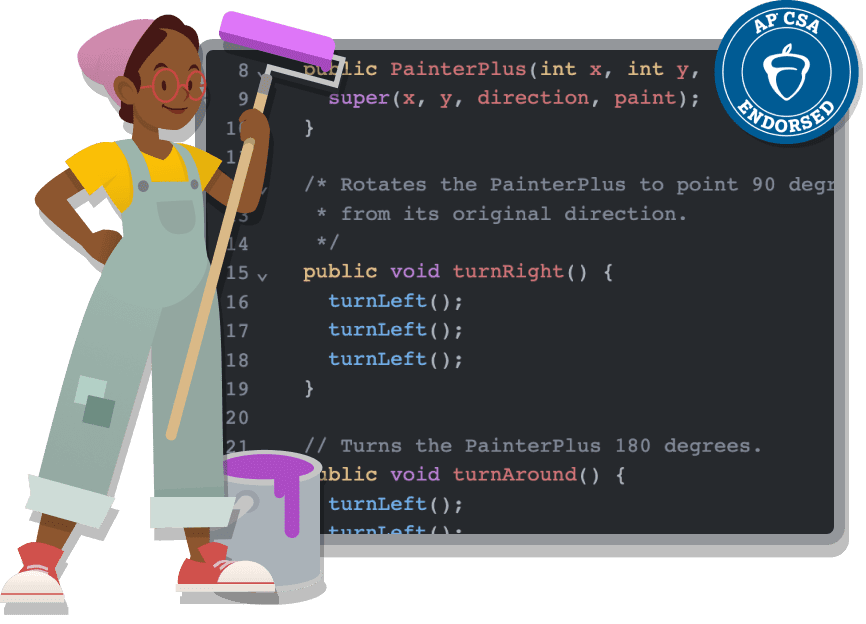

I could tell last year how different and better this curriculum and resources were than anything else out there. but this year, these past few weeks preparing students for the exam have been some of my most fun teaching. And I'm hardly doing anything! Kids understand the material and are talking with each other at such a high level and it's a direct reflection of the lessons and activities throughout the year. Thank you, thank you.
AP® Computer Science A Teacher
Java Lab is a programming environment where you can make Java programs using The Neighborhood, The Theater, or the console.
Students learn the fundamentals of object-oriented programming (OOP) first, giving them a foundation for the rest of the course while encouraging them to consider the overall design of their programs.


Students are offered the choice between a variety of tasks that reinforce course objectives while allowing for differentiation and customization, meeting students where they are at and encouraging them to go further.
Sign up for a Code.org account to get access to materials that will help you teach computer science with confidence. Code.org has extensive resources designed to support educators, even those without prior CS teaching experience.
Get step-by-step guidance, learning objectives, and assessment strategies for effective teaching.
Helpful resources include slide decks, activity guides, rubrics, and more — all organized in one place. Each lesson plan is accompanied by tips for classroom implementation, differentiation ideas, and extension activities to cater to students of all abilities.
Introducing How AI Works
Watch easy-to-understand overviews of computer science and programming concepts.
Code.org video series are designed specifically to support your classroom and are engaging and fun to watch.
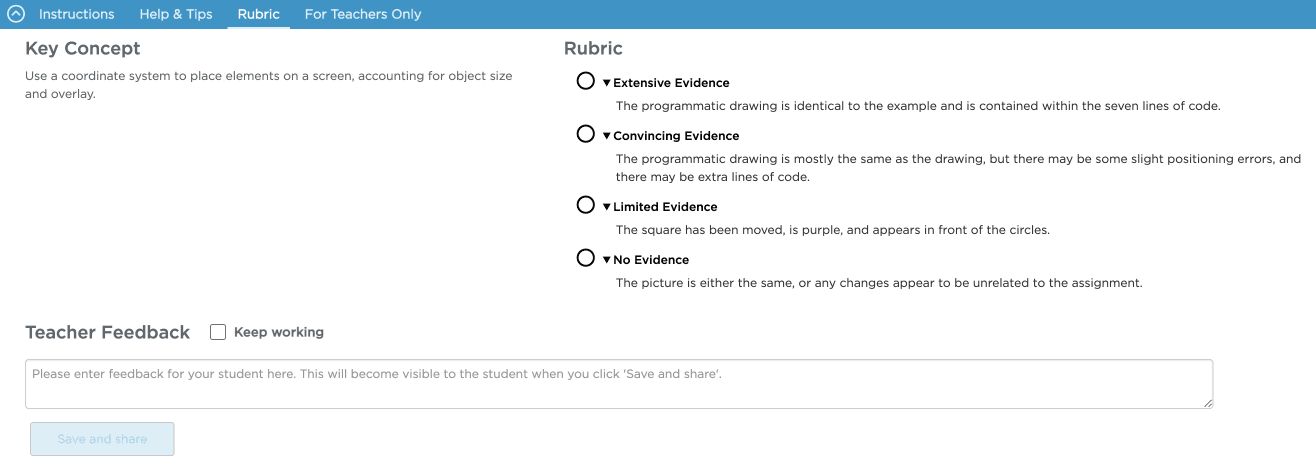
Our curricula includes a comprehensive system of formative and summative assessment resources.
These include rubrics, checklists, mini-projects, end-of-chapter projects, student-facing rubrics, sample projects, and post-project tests — all designed to support teachers in measuring student growth, providing feedback, and evaluating student understanding.
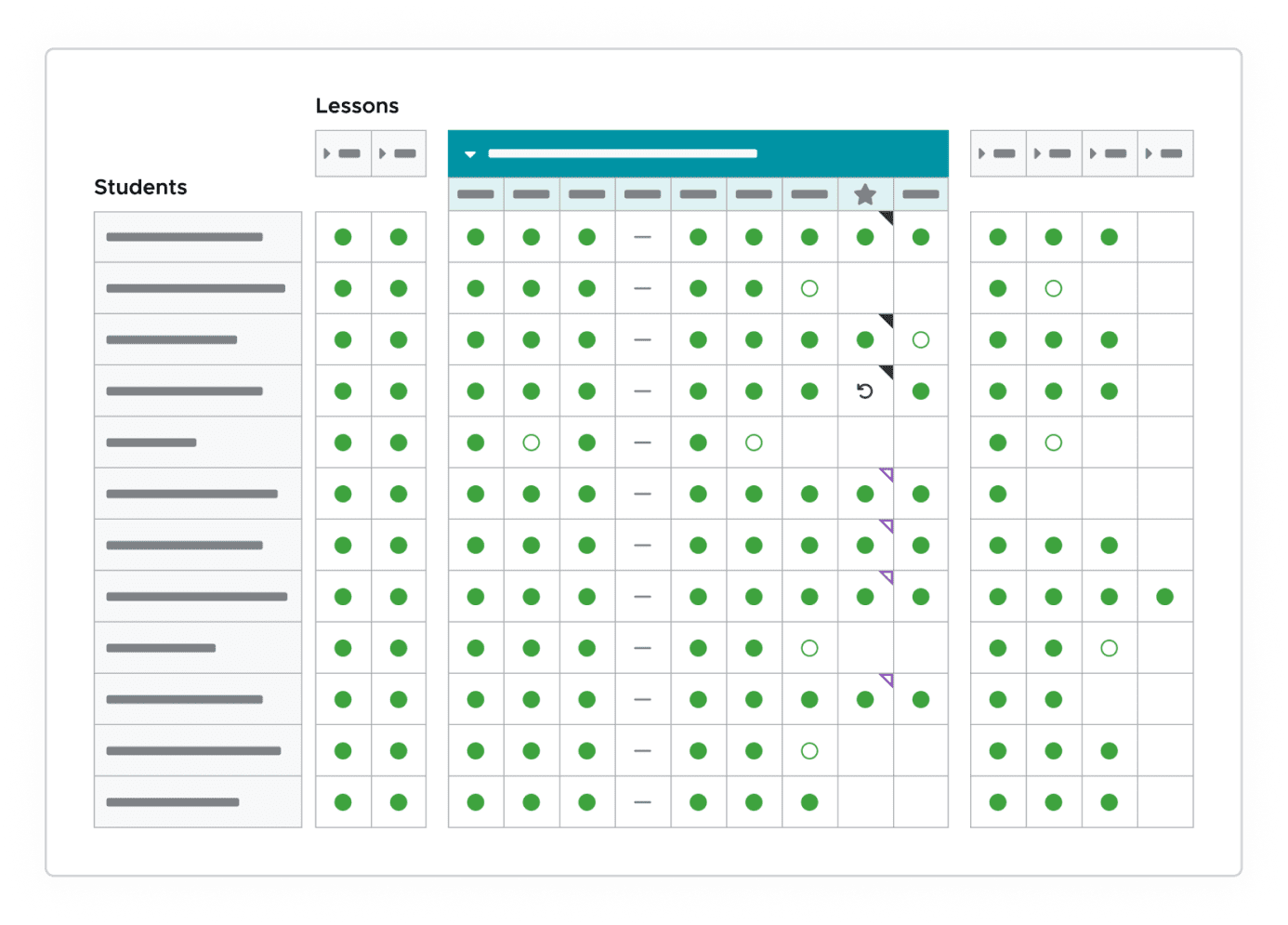
Our powerful progress view helps you monitor student work by providing insights into completion status, time spent, and more. Easily track each student's learning journey, quickly assess participation, and give personalized feedback.
Lesson PlansGet step-by-step guidance, learning objectives, and assessment strategies for effective teaching.
Helpful resources include slide decks, activity guides, rubrics, and more — all organized in one place. Each lesson plan is accompanied by tips for classroom implementation, differentiation ideas, and extension activities to cater to students of all abilities.
Introducing How AI Works
Watch easy-to-understand overviews of computer science and programming concepts.
Code.org video series are designed specifically to support your classroom and are engaging and fun to watch.

Our curricula includes a comprehensive system of formative and summative assessment resources.
These include rubrics, checklists, mini-projects, end-of-chapter projects, student-facing rubrics, sample projects, and post-project tests — all designed to support teachers in measuring student growth, providing feedback, and evaluating student understanding.

Our powerful progress view helps you monitor student work by providing insights into completion status, time spent, and more. Easily track each student's learning journey, quickly assess participation, and give personalized feedback.

Our highly supportive Professional Learning Program will bring you together with a group of teachers to learn from each other as well as expert facilitators as you take on the first year of teaching the free CSA curriculum to your students.
Prep for the exam
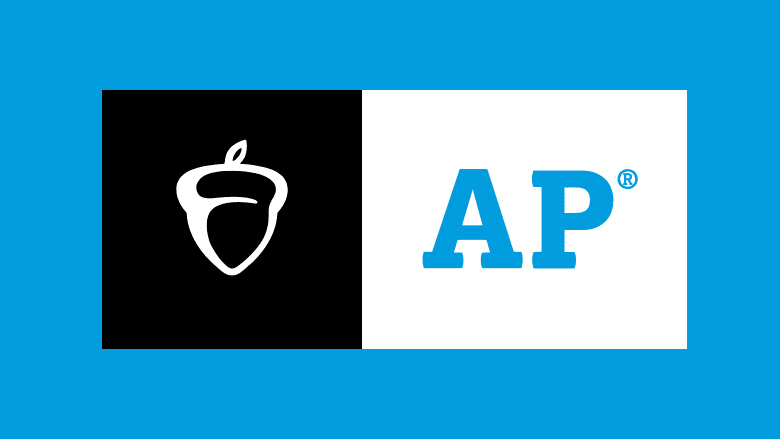
Unlock the full potential of AP Classroom with Code.org's custom quizzes, seamlessly mapped to our curriculum sequence. Empower your teaching and boost your students' AP exam readiness with practice materials that resonate with the way you teach.
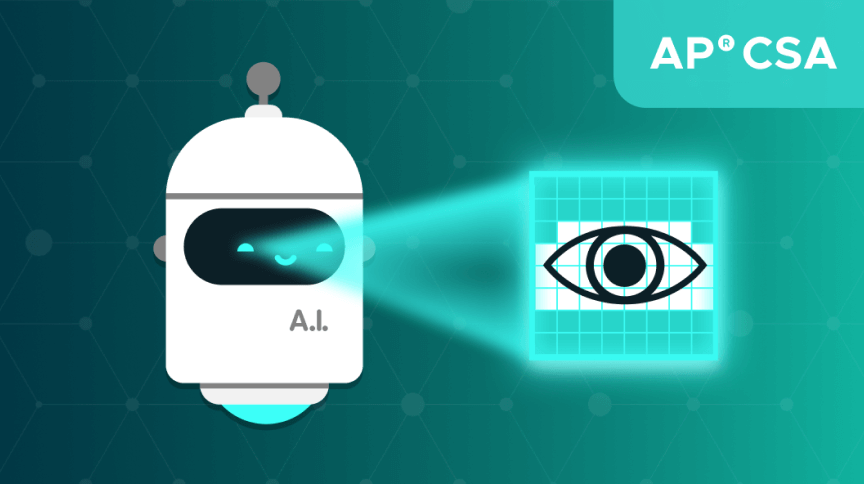
This two-chapter post-AP® CSA module offers high school students hands-on experience with professional software development tools, including GitHub and GitHub Copilot, and imparts them with the real-world skills to develop a computer vision program.
Yes, Code.org's CSA curriculum is mapped to the College Board Course and Exam Description for AP® CSA.
How much does it cost to teach CSA?
Our curriculum and platform are available at no cost for anyone, anywhere, to teach!
How/Where can I get professional development for CSA?
Professional learning workshops for Code.org's CSA curriculum start each summer. Click here to apply.
What is the recommended timing for teaching CSA?
A minimum of 140 class hours; should be taught as a full-year course. Contains nine units, which includes an AP® Exam Prep unit.
What materials do I need for this course?
This curriculum requires that students have access to computers with a modern web browser. At this time, our curriculum is not optimized for tablets or mobile devices. For more details, check out our technology requirements. In addition to technology, typical classroom supplies like scissors and sticky notes will also be used throughout the curriculum.
Why do I need to become a verified teacher to teach CSA and run code in Java Lab?
Java Lab is a unique environment from all other Code.org programming environments and requires additional measures to ensure network security for all. Read more about it here.
How can I access answer keys?
With an approved teacher account, you can find answer keys in a blue "Teacher Only" panel that shows in the online lessons and activities.
Teachers in our Professional Learning Program will automatically be approved to view answer keys. If you need an approved teacher account, you can apply for access to protected teacher-only materials (answer keys, etc) through this form. Please keep in mind that it may take 3-5 business days to verify your account.
How was the curriculum developed?
Our CSA curriculum was written by teachers, for teachers and was designed with our Curriculum Values in mind. In particular, we focused on expanding access to those who historically have been denied opportunities to learn about the exciting and impactful field of computing. The following goals guided the creation of the CSA curriculum:
This two-chapter post-AP® CSA module offers high school students hands-on experience with professional software development tools, including GitHub and GitHub Copilot, and imparts them with the real-world skills to develop a computer vision program.
Duration: 5+ hours

Beyond curriculum and professional learning, we have many materials to support your classroom.
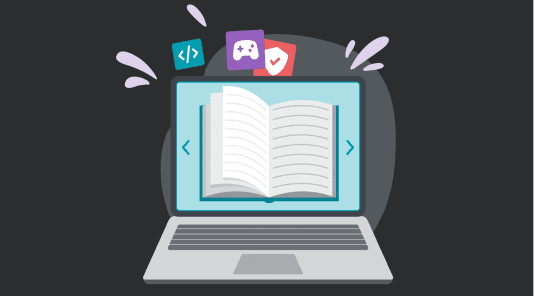
Comprehensive curriculum offerings for every grade and experience level featuring robust, structured, and self-paced learning options.

We offer a growing library of educational videos for use by educators worldwide, online or in classrooms.

Our customer support team is ready to answer your questions. Email us at support@code.org or check out our support center, which offers useful guides and answers!
In partnership with
Amazon Future Engineer is a comprehensive childhood-to-career program to inspire, educate, and train low-income and other disadvantaged children and young people to pursue careers in computer science. Learn about our partnership.